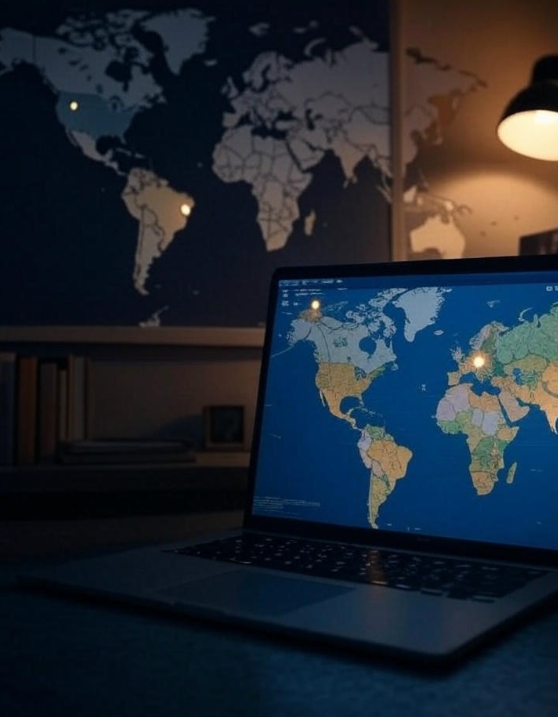Mastering the IP Location Checker: Your 2025 Essential Guide
In today’s digital landscape, knowing where an IP address originates can feel like wielding a superpower. Whether you’re a small business owner securing your website, a curious individual tracking online activity, or just someone who loves geeking out over tech, an IP location checker is your trusty sidekick. But what exactly is it, and why should you care? In this post, we’ll dive deep into the world of IP location checkers, unravel their benefits, and show you how they can make your online life smarter and safer. Let’s get cracking!
Table of Contents
- ✅ Understanding IP Location Checkers
- ✅ Why IP Location Data Matters in 2025
- ✅ Common Misconceptions About IP Location Checkers
- ✅ How to Use an IP Location Checker Effectively
- ✅ Advanced Use Cases for IP Location Tools
Understanding IP Location Checkers

Let’s start with the basics. An IP location checker is a tool that takes an IP address—a unique string of numbers assigned to every device connected to the internet—and pinpoints its approximate geographic location. Think of it as a digital detective that says, “Aha! This IP is coming from a café in Chelmsford, Essex, or maybe a server farm in Singapore.” It uses databases like MaxMind or GeoIP to map IP addresses to locations, often down to the city or region level.
Why does this matter? Well, imagine you’re running a website and notice suspicious traffic. An IP location checker can tell you if those hits are coming from a legitimate user in London or a shady bot in some far-flung corner of the world. It’s not just about security, though—marketers use these tools to tailor content, businesses use them to comply with regulations, and even gamers use them to find low-latency servers. Pretty versatile, right?
At Essex Web Hosts, we provide a slick IP location checker that’s fast, reliable, and user-friendly. Whether you’re a tech newbie or a seasoned pro, it’s designed to give you actionable insights without the headache.
How It Works
An IP location checker queries a database that maps IP addresses to geographic data. These databases are updated regularly to account for changes in IP assignments. For example, when you enter an IP like 192.168.1.1 into a tool, it might return details like:
- Country: United Kingdom
- Region: Essex
- City: Colchester
- ISP: BT Broadband
It’s not magic, but it’s close. The accuracy depends on the quality of the database and how frequently it’s updated—something we at Essex Web Hosts take seriously to ensure you get the most precise data possible.
Why IP Location Data Matters in 2025
Let’s talk numbers. According to a 2024 Statista report, global cybercrime costs are expected to hit £10.5 trillion annually by 2025. That’s not pocket change! With cyber threats on the rise, tools like IP location checkers are more critical than ever. Here’s why IP geolocation is a game-changer in 2025:
Enhanced Website Security
Hackers don’t send you a polite email before trying to breach your site. By using an IP location checker, you can spot unusual traffic patterns—like a flood of requests from a country where you don’t operate. For instance, if your e-commerce store is UK-based but you’re getting hits from a server in a high-risk region, that’s a red flag. Block those IPs faster than you can say “cybersecurity.”
Personalised User Experiences
Marketers, listen up! IP geolocation lets you customise content based on where your visitors are. If someone’s browsing from Manchester, you can show them local deals or currency in GBP. A 2023 HubSpot survey found that 76% of consumers prefer personalised experiences, and IP location tools make this a breeze without invasive tracking.
Regulatory Compliance
Data protection laws like GDPR are stricter than a headteacher on exam day. If you’re handling user data, knowing where it’s coming from helps you comply with regional regulations. For example, an IP location checker can flag whether a user is in the EU, ensuring you apply the right privacy policies.
Common Misconceptions About IP Location Checkers
Let’s clear the air. IP location checkers are awesome, but they’re not perfect, and there are some myths floating around like digital tumbleweeds. Here’s the truth about IP address tracking:
Myth 1: IP Location Checkers Are 100% Accurate
Nope, not quite. While tools like the one at Essex Web Hosts are highly accurate, they rely on databases that can occasionally lag behind IP reassignments. You might get a city-level match, but don’t expect it to pinpoint someone’s front door. That’s more sci-fi than reality.
Myth 2: They Invade Privacy
Some folks think IP location checkers are like Big Brother spying on their every move. Not true! These tools only use publicly available data tied to IP addresses, not personal info like names or addresses. They’re about as invasive as checking the weather forecast.
Myth 3: They’re Only for Tech Experts
Wrong again! Modern IP location checkers are designed for everyone. Whether you’re a small business owner, a blogger, or just curious, tools like ours are intuitive enough for anyone to use. No PhD in computer science required.
How to Use an IP Location Checker Effectively

Ready to get hands-on? Using an IP lookup tool is as easy as pie, but here’s a step-by-step guide to make you look like a pro:
- Find a Reliable Tool: Start with a trusted provider like Essex Web Hosts. Head to our IP location checker for a seamless experience.
- Enter the IP Address: Grab the IP you want to check—maybe from your website’s analytics or server logs—and pop it into the tool.
- Review the Results: Look at the country, region, and ISP data. If something looks fishy (like traffic from a known spam hub), take action.
- Integrate with Your Workflow: Use the data to block suspicious IPs, tailor marketing campaigns, or ensure compliance.
Pro tip: Combine IP location data with other analytics tools like Google Analytics for a fuller picture of your traffic. It’s like pairing a fine wine with a gourmet meal—everything just works better together.
Advanced Use Cases for IP Location Tools
For the tech-savvy among you, IP geolocation services offer some next-level applications. Here are a few ways to flex your IP checker muscles:
Fraud Prevention
E-commerce sites lose billions to fraud each year—£1.7 billion in the UK alone, per a 2024 UK Finance report. By cross-referencing IP locations with billing addresses, you can spot discrepancies. If someone’s card is registered in London but the IP is in Timbuktu, you might want to double-check that order.
Content Delivery Optimisation
Content Delivery Networks (CDNs) use IP geolocation to route users to the nearest server, slashing load times. In 2025, with Google’s Core Web Vitals still ruling SEO, every millisecond counts. An IP location checker can help you verify that your CDN is doing its job.
Competitive Analysis
Want to know where your competitors’ traffic is coming from? Tools like SimilarWeb paired with an IP checker can give you insights into their audience’s geographic spread. It’s like sneaking a peek at their playbook—totally legal, of course.
Conclusion
An IP location checker isn’t just a nerdy gadget—it’s a must-have tool for anyone navigating the wild west of the internet in 2025. From beefing up your website’s security to crafting hyper-personalised user experiences, the benefits are undeniable. Plus, with cyber threats on the rise and regulations tightening, knowing where your traffic comes from is no longer optional—it’s essential.
Ready to take control? Head over to Essex Web Hosts’ IP location checker and start exploring the power of IP geolocation today. It’s quick, it’s easy, and it’s your first step toward a smarter, safer online presence. Go on, give it a whirl—you’ve got this!
